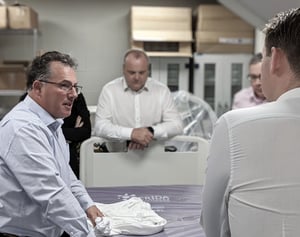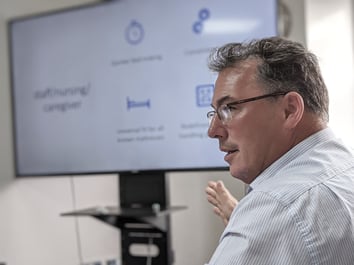From the perspective of:
Jim Goldthorpe - Business Development Manager; Scotland, Ireland & Overseas
MIP UK
Jim Goldthorpe is MIP's very own specialist in the acute and long term care field with 16 years of service under his belt along with significant previous experience working in laundry management and the supply of textiles to the healthcare industry. Jim is passionate about sustainable development and MIP's on-going commitment to corporate social responsibility and ethical practice and we are excited to publish this blog that discusses his views of corporate, social responsibility (CSR) and ethical practice throughout the industry...
Q1: In your opinion is having ethical practices important to MIP?

From our Corporate Social Responsibility (CSR) statement MIP make it clear that working ethically is part of our culture and the way that we operate. The long-term advantage of that is we do things properly and how they should be done and people are treated well and with respect all the way down the chain. Therefore, it’s only right that we demand that the products we use in our manufacturing and supply process locally and from overseas are also sourced ethically.
I would personally be ashamed if textiles and materials we used in our work were a result of people who are being treated unfairly, not being paid well or by means of child labour. This practice would not fit well with MIP, nor would it fit well with our customers, hence why I am delighted that MIP are at the forefront of ethical purchasing with the LSAS Level 4 Certification (Linen Standard Assurance Service). We make sure that all our supplier's factories are independently audited by internationally recognised auditing specialists.
It is striking to me that some companies don’t recognise the importance of the LSAS certification or equivalent standards, but I hope that in time prioritising ethical practices to such a level will become the standard across the industry. MIP I like to think, are a leader in this field as it fits with our culture.
Q2: What’s your opinion on classifying business success based on ethical codes?
When looking at a company’s internal processes, employees need the company to be financially successful, first and foremost, there is no escape from that. Companies do however have a responsibility, collectively to do this right, in the most ethical manor.
At MIP I am happy our company follows such high CSR standards, we know our customers benefit as a result and we also know that we are part of something good.

When we are supplying our products to the market, of course we understand that price is important, but as consumers we should consider how suppliers determine their prices. If a supplier arrived at a price by using unfair labour standards that are below the acceptable line in regular society, then surely that’s isn't right? Why should one supplier determine one price whereas other suppliers, applying CSR get to it in another way?
What if it was a level playing field? What if all suppliers committed to the same standards and all customers required the same standards?
When talking about ethical processes, a phrase I like to use is ‘bed to bud’ as I feel this defines the way MIP like to operate. MIP work backwards from the bed (finished product) down the supply chain all the way to the bud (raw cotton), including defining the country of origin where the yarn is produced. We know that the countries we deal with have systems in place to implement ethical practices and we also ensure that our yarn purchased has certification, proving the fibre has come from ethical sources. From that point we ensure the yarn goes into factories that apply the proper labour standards.
By adopting and implementing these procedures and practices, I think organisations can look forward to a successful future, assuming the rest of the business model is aligned and adapts with the times.







